- Home
- Saul Tanpepper
Iceland: An International Thriller (The Flense Book 2) Page 4
Iceland: An International Thriller (The Flense Book 2) Read online
Page 4
"Qui est là?" she called out. "Who's there?"
The shadow didn't move.
"J'ai une arme à feu."
The figure rotated slightly, evidently unfazed by her threat of a gun. Angel guessed from the person's height and stature that it was a man, tall and muscular. Ten meters separated them. She began to back away. He stepped forward.
"Je tirerai! I promise I will shoot!"
The man stopped. Strangely, she thought once more of Shanghai, of the sickly man who had killed her photographer. This man was nothing like him, and yet . . . .
She decided it wasn't worth the fight. The main road was only a few meters behind her. She'd be gone before he could catch her. But she had barely begun to pivot when a second person grabbed her from behind. The gun was wrested from her grip, and a beefy hand clapped over her mouth. A man urged her in a whisper to keep quiet.
Panic welled inside of her. She struggled, kicking and swinging her elbows, but the man was too strong. He began to force her toward the shadow at the other end of the walk. She renewed her struggles with greater vigor.
"It's alright," the man standing before her said. "You can let her go."
Angel froze, shocked still by the familiar voice. Slowly, the hand lifted away from her mouth. For a moment, she could do nothing but stand and stare.
"No names," Norstrom warned her, his voice barely above a whisper. "Not here. We might be overheard."
"What the—" Angel gasped. She staggered away from the man she had come to accept had probably died from his injuries. After all, she hadn't heard a peep out of him in five months. But now, here he was, not dead, and she simply couldn't reconcile it. "You— What the hell are you doing here?"
"You were being followed," he told her in a harsh whisper. "And I don't mean by me, either. Someone else has been tracking you for days now."
"D-days?" she stammered, the revelation knocking her even further off balance. "Who? Why?"
"I don't know. Ever since you arrived in the city last week. Perhaps even longer. I've been trying to figure out who he is, but he's a crafty bastard, resourceful. Ever since he figured out I've been watching him, he's become like a ghost. He won't let me get close."
He gestured at the entrance to the park, a movement Angel sensed more than saw in the near pitch dark. "I thought if I waited here, we might have a chance to grab him, but he always seems to sense a trap and vanishes."
She turned, but the pathway was clear. The man who had grabbed her from behind was gone. "I have not seen anyone following me."
"I think that's the point. You're not meant to."
"But you have seen him," she said, stupidly.
"Glimpses. And I'm trained to notice such things."
"Wha— What does he look like?"
She dreaded what Norstrom would tell her, but she needed to know.
"Your height, average build," he rattled off. "Youngish maybe, hair unknown. We've only seen him with a hat on. Unremarkable street clothes. Forgettable appearance. He blends in well. My men have been unable to get close, much less lay a hand on him."
Angel was quiet for a moment, greatly relieved that his description didn't fit the image which had floated into her mind. She had expected him to tell her that the stalker was tall and rail thin, dressed all in black. A thin, dark man with piercing eyes, whom some might describe as the devil himself. Like the man who had plucked Jamie from the wreckage of the train crash half a world away, half a year ago.
She had never seen him herself, and yet he was one of the most frequent visitors to her nightmares.
"Did you hear me?" he asked.
"What?"
"I said we need to find another place to talk. This is too public."
"H-how did you know to find me here anyway? How could you know I would be coming through this park?"
Norstrom chuckled. "You're quite predictable."
"I am not!" She shoved him away.
"It's the same path you've taken the past three evenings." He sighed. "Look, I told you I'd keep an eye on you. The last time we spoke, I—"
"That was five months ago! Five months without a single word from you!" She wished there were a little more light so he could see just how angry she was with him. "I thought you were dead!"
"It took me a long time to recover my own strength, weeks before I could get back to work. In fact, I'm still not one hundred percent, and I doubt I ever will be. Besides, I seem to remember you telling me not to call you."
"And I meant it, Nors—!"
"Shh! Keep it down."
"Why? There is nothing to hear and no one to hear it!" she cried. She tried to push past him and was surprised when he allowed her to go. "Just leave me alone. I told you before I do not want anything to do with you or Cheong."
"No names!" he hissed.
"Norstrom!" she snapped, whirling around. "Norstrom! Cheong! Voilà. See? Nobody cares!"
He reached out for her, but she slapped his hand away. "I want you to leave. Leave me alone."
"I can't do that."
There was a hint of wistfulness in his voice, something in the tone that startled her. What could it mean?
She laughed cruelly. "You are not my type!"
"That is not what this is about."
She didn't have feelings for the man — God no! — and she sure as hell didn't want him to have feelings for her. The last thing she needed was that kind of complexity in her life. And yet, for no reason at all, the rebuttal hurt. It made no sense whatsoever.
He stepped toward her. "Can we go somewhere else? It's not safe here."
Once more she pulled away from him. "There is nothing to talk about. I told you, I am finished with—"
Again he shushed her.
"You just do not get it, Norstrom! Whatever happened back there, I am finished with it. Tout fini! It is out of my life. I am not going to help you. Leave me out of it!"
She pushed him away, back toward the road. He stumbled but didn't resist.
"And stop following me!"
She could feel his eyes on her as she ran away. And she was disappointed when he didn't try to stop her.
Chapter Five
Angel arrived back at the encampment early the next morning after a restless night at the hotel. She was alone this time, not requiring Omar's assistance. He had offered to accompany her without pay, but she insisted. "Spend time with your family," she told him. For a minute, she believed he might try to follow her anyway.
She was surprised to find the sick man from the day before, Sharif Hosnani, already on his feet. He appeared drained, but his color had significantly improved. Instead of ashy gray, his skin had returned to a ruddy brown, shiny instead of husky. The recovery was, quite simply, remarkable.
Mahdi Haddad extracted himself from the group when he saw her approach, intercepting her before she could get any closer. "So, you have found my brother?" he quietly asked.
She shook her head, disappointed that the missing man hadn't appeared overnight. She had tried the cell phone number Mahdi provided several times and received a "mailbox full" message in return. "I wanted to check on Monsieur Hosnani first," she said. "Then the rest of the day is yours."
"There is no need," Mahdi replied, gesturing at the group. "As you see, he is all better. I tell you yesterday that he will be better after medicine. It is working very fast, yes?"
Though the mood was considerably more relaxed than the previous day, the group continued to watch her with wariness in their eyes. They seemed to be taking their cues from Mahdi. But the moment Angel pulled a stethoscope from her bag, they immediately grew anxious, especially when Mahdi yelled at her. "You tell me you are writer, not doctor!"
"I am a writer," she declared. "I am . . . both a journalist and a doctor. Please. I just want to listen to his lungs."
Once again, she promised them that she held no affiliation with any hospital or government organization. "No harm will come from checking his lungs," she said.
They finally acqui
esced, but the wall between her and them had gone back up. They watched her carefully as she placed the stethoscope on the man's bony chest.
"He's clear," she announced after a moment, keenly aware of their eyes on her. She put the instrument away, but the tension remained high.
"You go now," another man told her.
Mahdi nodded. "I think it is good idea."
He walked with her, leading her away from the group.
"I just do not understand it," she mused. "Less than twenty-four hours ago, that man was dying." Of that, she was convinced. The stink of his infection and the effort of his breathing the day before were undeniable signs that he suffered from an advanced stage of pneumonia. "Now, he is barely having any trouble breathing. And his fever is gone, too."
"It is medicine," Mahdi declared.
She asked him again if he wanted the bottles of vitamins in her bag, but he refused, telling her they didn't need them.
"And do you still want me to help look for your brother?"
"Yes," he quietly replied. "Now it is time for you to look for Farid Haddad."
* * *
They set off at noon, checking first with the medical facilities in the vicinity of the Gare d'Austerlitz, then heading outward from there.
It had taken some coaxing to convince Mahdi to accompany her. The other men warned him not to go. But Angel could see how torn he was, wanting to play an active role in his brother's search, yet fearing for his own safety.
She told him he was being unreasonable, and in the end he relented. But at each stop they came to, he flatly refused to get out of the van. He also insisted that she not use his or his brother's surname, although he did provide her with a photograph to show around, which he sent to her from his own cell phone.
By late afternoon, they had checked in at nearly a dozen different facilities. None had any record or memory of Farid's visit or of any sick migrants on the day in question.
On a whim, Angel decided to try a small pharmacy across the Charles de Gaulle Bridge in a seedy part of the 12ÈME Arrondissement. They had passed it earlier, and Angel initially dismissed it out of hand. The place had a decidedly disreputable look to it, which she knew meant the establishment likely offered prescriptions and medical treatments off the books, often by unlicensed practitioners and sometimes at considerable risk to the patient. Payments were always in cash, the prices inflated. And refunds were not given.
It was just the place one would seek if one wished to stay out of the socialized medical care system. She knew that, but she doubted Farid would. He was a relatively new arrival to Paris, and it was unlikely he'd be aware of the option.
Which is why she was surprised when the girl at the counter recognized Farid's photograph and acknowledged that he had been accompanied by two other people on the day in question. "They were both sick, but the woman was in terrible shape," she told Angel in French. "She was pregnant, bleeding. They wanted to purchase antibiotics."
"Did you sell them?"
"They did not have a doctor's prescription."
"They were very sick, you said so yourself. So, you turned them away?"
The girl was quite young. Angel could tell that she wanted to please.
"I don't care about what happens here or whether it is legal or not," Angel said. "I only want to know about these people. If you did not help them, would you know where they went afterward? Did you recommend another place?"
The girl shook her head. "The pharmacist might have." She quickly disappeared into a back room to check.
The girl did not return. Instead, an older woman appeared, a nurse perhaps. "Barre toi!" she shouted at Angel, and swept around the counter, gesturing angrily. "Go!"
She forced Angel out the front door and locked it behind her. The blinds snapped shut, rattling against the glass. Angel gripped the metal grillwork on the door and shook it, but the woman refused to speak with her.
She sat with Mahdi in the van for the next two hours, waiting for the clinic to close. Finally, the older woman exited and made her way briskly toward the Gare de Lyon. She looked shocked when Angel and Mahdi cut her off.
"I will call the police!"
"Go ahead," Angel countered. "When they arrive, I will tell them that you are selling medicine illegally. Now tell us what you know about these people. Where did they go?"
"I don't know."
"You're lying."
"It is the truth! All I know is that we were instructed to call a certain phone number if any of the foreigners from the encampment showed up looking for treatment."
"What number? Who?" Angel asked. Mahdi interrupted her, impatient for a translation, which she provided. "Was it the public health services who came?"
The woman hesitated, then nodded, but her face gave her away as a liar.
"Who came for them?" Angel pressed. "The truth this time."
The nurse's eyes darted about with increasing agitation. She begged them to leave her alone.
"Tell me!" Mahdi shouted in English. He stepped forward, his face red. "Who took my brother?"
"Non! Fiche moi la paix! Laisse-moi tranquille!" the woman shouted back.
"What is she saying?"
"She wants us to go away and leave her alone."
Mahdi balled his fists and stepped toward her. His face was twisted with fury. "Tell me!"
The woman spun away and tried to run, but her shoe caught in the rail. She sprawled onto the gravel, sobbing.
"Stay away from me!" she screamed in French. Angel grabbed at Mahdi to hold him back. The woman scrambled, got up, glanced back, and started to limp away. Blood dripped down her knee. Her shoe had come off. She didn't bother to pick it up.
"Stop it!" Angel scolded Mahdi. "It won't do any good to scare her even more, not if we want to learn anything."
But he wouldn't listen. He wrenched himself away and caught the woman, grabbing her arm and spinning her around. "It is my brother," he shouted at her face. "My brother! Do you understand?"
"Laisse-moi tranquille! Laisse-moi!"
"She can't understand—"
"She knows!"
Angel pulled Mahdi away, hissing and pointing at the pair of uniformed officers walking on the train platform. They were inside the fence and hadn't noticed the commotion yet, but all it would take was for one of them to look. Then a radio call. And Angel knew how quickly the police and other security people would respond, especially so close to a train station. After the Paris terror bombings, no one took any chances.
"Tell us," Angel begged of the woman. "Tell us who took them and where, and we'll leave you alone."
"Je ne sais pas!"
"She says she doesn't know, Mahdi. We have to let her go."
"She is liar! She does know."
"At least tell us what the people looked like," Angel asked. "The ones who took them. What were they wearing? Did they have business cards? Paperwork?"
"Je ne sais pas! Non!"
"What about a jacket? Was there a label on it? Writing? Were there any markings on their vehicles?"
The woman moaned. She looked from Angel to Mahdi. There was terror in her eyes. "Un homme avec les vêtements noirs."
"Half the people in this city wear black clothes," Angel hissed. "That doesn't help."
With a terrified yelp, the woman ran off, screaming. This time, the policemen turned.
Angel grabbed Mahdi's arm and pulled him back to the van, ignoring the shrill sound of their whistles.
Chapter Six
Angel saw Norstrom through the window of the antique shop the following evening and would have panicked if the anger that immediately followed didn't consume it. He had placed himself exactly where he knew she would notice him, and it was another uncomfortable reminder of exactly how predictable she was, just as he'd accused her of being.
She almost continued on without stopping, just to spite him, but after a moment's hesitation, she went inside.
The day had not been kind to her. Her search for Farid Haddad had yiel
ded no new information. In fact, she was starting to feel like she'd bitten off more than she could chew by promising Mahdi something that might be beyond her ability to deliver.
The refugee crisis was so much worse than she had realized, and the official processes in place to account for them were so inherently flawed, that she was beginning to get a sense of the mountains she might have to climb to get anywhere. How could anyone reliably track the hundreds of thousands of people moving about the continent, perhaps even millions? Tracking systems were overwhelmed, providing inaccurate and incomplete records of their movements.
She had returned to the pharmacy early that morning with Mahdi and found it closed. So they'd waited, hoping that someone might eventually show up. But by midmorning, when no one did, they lost patience and went up to the door. It was shuttered, the metal gate pulled closed and locked up tight. The lights inside were off. Being a weekday, the store's closure immediately struck her as suspicious, and her skin prickled as they stood there in the bright sunlight. She couldn't shake the feeling they were being watched.
A breeze blew from across the tracks, a frigid thing that sliced through any warmth the sun provided and found its way beneath her coat, deepening her chill. But when she peered about them over the concrete and metal wasteland, nothing seemed out of the ordinary.
The sign on the door indicated that the proprietors would return in thirty minutes. They waited for another hour then left when no one came.
There was little more Mahdi could do to assist her, so she dropped him off at the encampment. He had told her which local prefecture office he and his brother had applied to for asylum. The building, Maison Desjardins Richelieu, was not hard to locate on the Rue Saint-Mathias.
The sidewalk outside was occupied by a long line of Middle Eastern and Northern African people, mostly men. Police stood to the side, fluorescent vests covering their black uniforms. They joked with the children and smoked with the men. The women stood silently inside their burkas and did neither.
Angel joined the line and ended up waiting for almost five hours just for the hope of speaking with the receptionist. The men ignored her for the most part. They tended to keep to themselves, and only acknowledged her presence when she tried to engage the women and children in conversation.

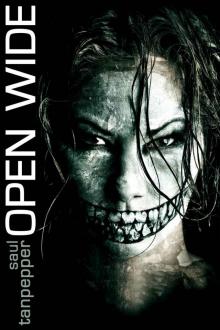 Open Wide
Open Wide Deep Into the Game: S.W. Tanpepper's GAMELAND (Episode 1) (Volume 1) (S. W. Tanpepper's GAMELAND)
Deep Into the Game: S.W. Tanpepper's GAMELAND (Episode 1) (Volume 1) (S. W. Tanpepper's GAMELAND)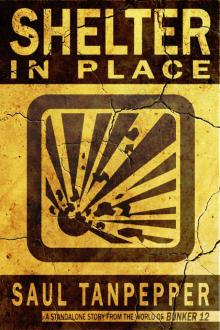 Shelter in Place: A short story from the world of BUNKER 12
Shelter in Place: A short story from the world of BUNKER 12 Iceland: An International Thriller (The Flense Book 2)
Iceland: An International Thriller (The Flense Book 2) GAMELAND Episodes 1-2: Deep Into the Game + Failsafe (S. W. Tanpepper's GAMELAND)
GAMELAND Episodes 1-2: Deep Into the Game + Failsafe (S. W. Tanpepper's GAMELAND)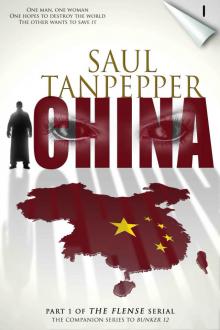 THE FLENSE: China: (Part 1 of THE FLENSE serial)
THE FLENSE: China: (Part 1 of THE FLENSE serial) S.W. Tanpepper's GAMELAND, Season One Omnibus
S.W. Tanpepper's GAMELAND, Season One Omnibus Golgotha: Prequel to S.W. Tanpepper's GAMELAND series (S. W. Tanpepper's GAMELAND companion title Book 1)
Golgotha: Prequel to S.W. Tanpepper's GAMELAND series (S. W. Tanpepper's GAMELAND companion title Book 1)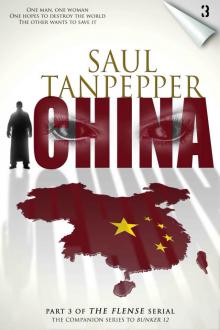 THE FLENSE: China: (Part 3 of THE FLENSE serial)
THE FLENSE: China: (Part 3 of THE FLENSE serial) Leviathan: A Short Story About the End of the World
Leviathan: A Short Story About the End of the World Insomnia: Paranormal Tales, Science Fiction, & Horror
Insomnia: Paranormal Tales, Science Fiction, & Horror Velveteen
Velveteen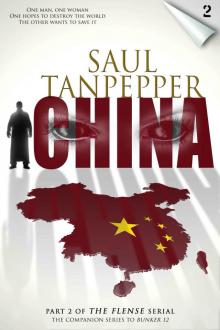 THE FLENSE: China: (Part 2 of THE FLENSE serial)
THE FLENSE: China: (Part 2 of THE FLENSE serial) Deadman's Switch & Sunder the Hollow Ones
Deadman's Switch & Sunder the Hollow Ones